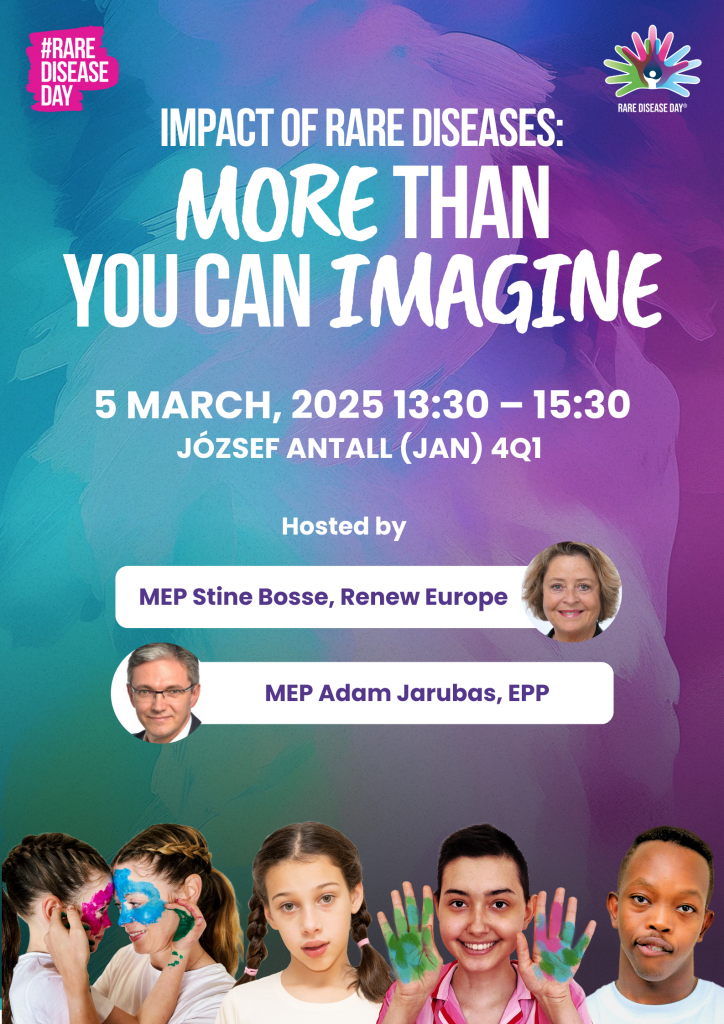European Parliament Event on Rare Disease Day
January 2025
To mark Rare Disease Day 2025 and celebrate the launch of the new European Parliament Intergroup on Cancer and Rare Diseases, MEPs Stine Bosse, Adam Jarubas, and EURORDIS-Rare Diseases Europe are organising this special event: “Impact of Rare Diseases: More than you can imagine”.
This event aims to:
- Recapitulate the issue of rare diseases to EU policymakers at the start of the new political mandate.
- Foster a deeper understanding of the challenges faced by people living with rare diseases and their families.
- Present concrete EU-level solutions to address these issues effectively.
This event is part of a broad range of activities for Rare Disease Day, a globally coordinated movement advocating for equal opportunities, healthcare access, and timely diagnosis and treatment for people living with rare diseases. This year’s theme, “More than you can imagine,” highlights the far-reaching impact of rare diseases on individuals, families, and society if no concrete measures are taken.
Throughout the event, we will:
- Present the impact of living with a rare disease on individuals and their families, as well as the broader effects on healthcare systems, social structures, and society.
- Illustrate first-hand experiences with the latest data and evidence, providing a comprehensive understanding of the realities faced by the rare disease community.
- Outline actionable policy solutions at the European level, focusing on legislative and non-legislative measures to be prioritised during this EU mandate.
Watch the event
Programme
Setting the scene: 13:30-14:00
| Introduction MEPs Adam Jarubas (EPP, Poland) & Stine Bosse (Renew, Denmark) | Introduction and welcome |
| Rare Disease Day 2025 official video | Watch the video |
| Setting the scene Adéla Odrihocká, Rare Diseases Czech Republic | Reflection key results from EURORDIS Rare Barometer survey results as seen through the lens of personal experience. |
| Impact of Rare Diseases: facts and figures Tim Wilsdon, Vice President, Charles River Associates | Overview of key figures related to a study on the impact of rare diseases. |
Tripartite sessions: 14:00-15:10
| Easier, faster and more accurate diagnosis of rare diseases – Olaf Riess, Institute of Medical Genetics and Applied Genomics and Centre for Rare Diseases, Tübingen – Thomas Minten, KU Leuven – MEP Vlad Voiculescu (Renew) | The diagnosis of rare diseases takes an average of five years, with young patients and women facing even longer delays. This prolonged “diagnostic odyssey” highlights the need for tailored strategies to improve diagnosis rates, reduce waiting times, and address inequities. Limited national capacities for genetic testing and unequal access to evolving technologies contribute to disparities across Europe. To ensure equal diagnostic opportunities, EU-level initiatives should enhance cross-country collaboration, particularly in newborn screening. Strengthening Centres of Expertise (CEs) and European Reference Networks (ERNs) is essential to streamline diagnoses and improve outcomes for rare disease patients. |
| Development and Access to treatments for people living with rare diseases: EU cooperation and support needed – Sebastian Honoré, Cure Lowe Foundation – Stefano Benvenuti, Head of Public Affairs and Market Access, Fondazione Telethon – MEP Stine Bosse (Renew) | It is estimated that fewer than 5% of the known rare diseases have at least one approved pharmacotherapy. This issue is compounded by unequal access to treatments across the EU due to high costs, healthcare disparities, and reimbursement challenges. Addressing these inequalities requires promoting rare disease research, improving funding and coordination, and ensuring treatments are accessible and affordable. Upcoming EU pharmaceutical legislation should balance encouraging innovation with equitable access, involve patients in decision-making, and strengthen cooperation on pricing and procurement to create a more unified and fair approach to rare disease care across the region. |
| Holistic care and support to address the impact of living with RDs – Adéla Odrihocká, Rare Diseases Czech Republic – Karsten Vanden Wyngaert, Department of Nephrology, Ghent University Hospital and ERKNet Member – MEP Tilly Metz (Greens, Luxembourg) | Eight in ten people with rare diseases live with disabilities, but their disabilities are often not adequately recognised, limiting their access to support. People with rare diseases are also three times more likely to experience unhappiness and depression and face nearly four times higher unemployment rate than the EU’s general population. These converging limiters to full social participation mean that it is even more key for the rare disease community to have access to person-centred, lifelong, and multidisciplinary care and support. Policymakers should support implementing guidelines to improve care and support for the rare disease community, ensuring their inclusion in EU mental health policies, and tackling unemployment gaps through the upcoming review of the European Pillar of Social Rights Action Plan. |
Concluding remarks: 15:10-15:30
| European Economic and Social Committee (EESC) representative Ágnes Cser, European Economic and Social Committee rapporteur | Institutional remarks linking to latest EESC Opinion on Rare Diseases. |
| More than you can imagine Virginie Bros-Facer, Chief Executive Officer, EURORDIS | Summary of cross-cutting issues and need for EU Action Plan, as well as continued financial support in the upcoming Multiannual Financial Framework (MFF). |
| Concluding remarks Stine Bosse MEP (Renew, Denmark) | Wrap-up and goodbye. |
For further information requests, please contact our Public Affairs Manager, Rachel Butcher via email: rachel.butcher@eurordis.org
